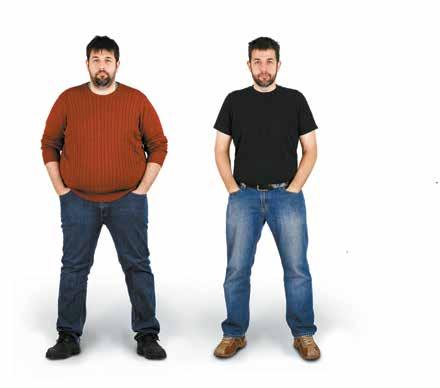
12 minute read
INTEGRATIVE
Integrative Hospital Care Medicine Embraces Holistic Modalities
Thirty years ago, hospital patients were treated for symptoms based on the Western medical model, and holistic modalities were excluded, largely due to a lack of reliable scientific studies. More recently, because of promising research, the traditional template is expanding. The Academic Consortium for Integrative Medicine & Health encompasses 75 university health centers and health systems that offer integrative approaches—a remarkable seven-fold increase in 21 years. America’s top hospitals, including the Memorial Sloan Kettering Cancer Center, the Mayo Clinic, the Duke University Medical Center and the Yale New Haven Hospital, now offer therapies such as acupuncture, reiki, homeopathy, touch therapy, yoga, clinical aromatherapy and chiropractic.
Advertisement
According to a report in Advances in Medical Education and Practice, nearly half
by Marlaina Donato
of Americans receiving medical care use alternative medicine (although 80 percent don’t inform their doctors) and physicians agree on the importance of further research and training in such modalities. A 2017 University of California survey published in the Journal of Alternative and Complementary Medicine found that hospital patients of all ages were willing to pay out of pocket for healthier food, therapeutic massage and energy work.
Disease: The Big Picture
“Research has repeatedly shown that even with full medical access and optimal medical treatments, a population’s health improves by only about 15 to 20 percent. The rest comes from lifestyle, environment and the social and personal determinants of health. Even factors like emotional health, what you feel is your purpose in life and what motivates you to be healthy plays a role,” says physician Wayne Jonas, in Alexandria, Virginia, a clinical professor of family medicine at Georgetown University and former director of the World Health Organization Center for Traditional Medicine. As executive director of Samueli Integrative Health Programs, which aims to make integrative health regular and routine, Jonas emphasizes that patients become healthier and medical costs are reduced when they are engaged in the healing process.
For Jonas, the shift toward integrative health care has become most evident during the current opioid crisis and the search for non-pharmacological approaches like acupuncture and therapeutic massage therapy for pain management. “The evidence body for many of these approaches has grown tremendously over just the past five years, and has shown a spotlight on what
works and what doesn’t. These approaches are now recommended in national guidelines as mainstream for chronic pain.”
Denise Millstine, integrative physician and internal medicine specialist at Mayo Clinic in Arizona, concurs: “The opiate crisis is an example of the need to broaden our clinical toolbox to incorporate care strategies that are less risky. I believe this change has been multifactorial, based on patient demand and more awareness of the importance of lifestyle management.”
Patient demand is also fueled by a desire to avoid medication side effects. In 1998, the Journal of the American Medical Association reported that 106,000 hospital deaths take place each year from adverse reactions to prescription drugs. With more than half of Americans already taking a pharmaceutical drug, and three being the average, adverse side effects can easily mount in a hospital setting.
For Millstine, integrative medicine offers many solutions.“We might recommend the best medication or provide cutting-edge therapies, but without considering stress management, resilience, movement and what people ingest, it’s hard to get optimal results. Integrative medicine expanded my approach to include nutrition, exercise, mind-body (connection), spirituality and other medical philosophies like Traditional Chinese Medicine (TCM) in the patient’s therapeutic plan.”
Whole-Patient Cancer Care
A 2016 meta-analysis byTaipei Medical University published in the journal PLOS ONE concluded that certain applications of acupuncture reduce pain and opioid use on the first day after surgery. Acupuncture—an ancient modality based on the concept of energy meridians in the body—is also offered in many major hospitals to offset the side effects of chemotherapy and radiation.
Acupuncture treatments at the Mayo Clinic are given in a calming atmosphere of soft lighting and music, and performed by trained doctors, as well as licensed acupuncturists with a firm TCM foundation.
Integrative health care addresses the emotions that accompany a cancer diagnosis, and patients undergoing conventional treatment now have access to not only acupuncture but therapeutic massage, meditation, movement therapy, clinical aromatherapy, herbal applications, biofeedback and yoga. Millstine says of theMayo Clinic, “We have oncology-trained massage providers who are comfortable with what is and what isn’t safe after someone has had a cancer diagnosis and/or treatment.”
Jonas highlights that when given under the supervision of a doctor and with conventional cancer care, complementary therapies may help people to manage cancer symptoms, boost overall well-being, better handle side effects of treatment and reduce the risk of cancer recurrence. “Integrative cancer care can help by activating one’s ability to heal and feel better physically and emotionally,” he says. “Lectures on nutrition, yoga classes and support groups for cancer patients are now common.”
The Urban Zen Integrative Therapy Program, launched by American fashion designer Donna Karan in 2009 after her husband died from cancer, partners with heavy hitters such as the American Cancer Society and the Beth Israel Medical Center, in New York City. In many hospital settings, Urban Zen is creating “Zen dens”, calming nooks where staff can discuss cases with colleagues, take a break for self-care or talk to their patients in a nurturing environment. Urban Zen’s dedication to healthcare integration is international and promotes therapeutic applications of reiki, essential oil therapy, nutrition and other contempla-
Energy Medicine Goes Mainstream
“Alternative therapies are no longer considered ‘alternative’ when conventional medicine adopts them—for example, using calcium and vitamin D supplements, which are a standard consideration,” says Millstine. “With high-deductible plans, many patients are accustomed to paying out of pocket for care, thus making payment for alternative providers possibly more palatable.”
Reiki, a Japanese form of energy medicine once considered alternative, is now offered at major hospitals like Yale New Haven, where it’s given free of charge to cancer patients. Many hospitals are also offering classes in energy work to families of patients, hospital staff and the community.
“A medical doctor introduced me to the practice when my grandmother was diagnosed with lung cancer,” says Denise Baron, aPhiladelphia-basedreiki practitioner who works with referrals from clients and wellness professionals. “A hospital does not hire me directly, but the staff know I am available. I’ve worked on patients postsurgery, during and after births, people with cancer and people in hospice. I would say 96 percent of clients walk away with a deep experience of peace, harmony and lower stress levels.” Most recently, she has seen an
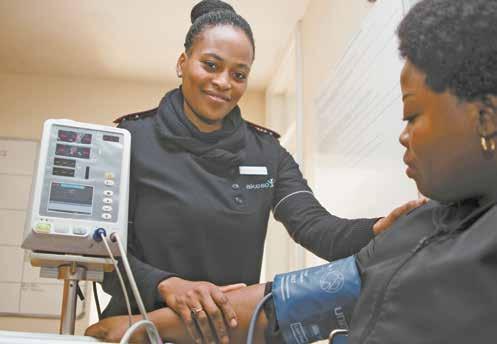
increase in nurses asking for support during stressful times, with many wanting to learn how to practice reiki themselves.
According to a 2017 study published in the Journal of Evidence-Based Complementary and Alternative Medicine, reiki is more effective than a placebo and activates the parasympathetic nervous system via the vagus nerve. Results include lower blood pressure and less anxiety and depression. Other research shows that the modality also reduces nausea, improves appetite and lessens fatigue.
Holistic Nursing’s Role
Collaborating with physicians and holistic practitioners, nurses play a key role in integrative hospital care. “We all work together to facilitate the client towards a higher level of well-being. Each profession brings something to the table,” says Margaret Erickson, in Cedar Park, Texas, CEO of the American Holistic Nurses Credentialing Corporation.
The nurse’s role in a patient’s healing journey is an intimate one, and holistic nurses ensure that the whole patient is tended to. “The roots of holistic nursing, grounded in holism, were verbalized over 150 years ago by Florence Nightingale,” says Erickson. “She believed in the mindbody-spirit-emotion connections and that all aspects need to be nurtured in order for people to heal.”
Due to increased demand, more nursing schools are creating educational programs grounded in holistic philosophy, she says. “What makes a nurse holistic is not the skills or alternative therapies she/he/they do, but rather how they show up in their interactions with others. They value and recognize that they are gifted with sharing a person’s most vulnerable moments, and that this shared space is sacred.”
Some holistic nurses may use healing therapies such as guided imagery, aromatherapy, energy work, bodywork, deep breathing, mindfulness and meditation to help both their clients and other healthcare providers.
Those in the field of integrative medicine agree that the future of medicine is now. “People are becoming more self-aware and taking responsibility for their health and life. Consciousness is growing [by] leaps and bounds,” says Baron.
Jonas, drawing on 40 years of experience, agrees. “By working as partners with our patients to help find the care that works for them, we can help them achieve better health and quality of life.”

Marlaina Donato is the author of several books and a composer. Connect at AutumnEmbersMusic.com.
BETTER, Naturally
Christie Potter, APRN, CPNP-PC Annalise Clayborne, APRN, CPNP-PC Rebecca Greco, APRN, CPNP-PC Eileen Yearwood, APRN, CPNP-PC
HELPING CHILDREN THRIVE THROUGH INTEGRATIVE, NATURAL AND HOLISTIC PEDIATRIC CARE

At Natural Choice Pediatrics, we believe in treating the whole child to empower your family to live healthier lives, naturally. NCP is vaccine friendly and we welcome all your families little and big ones. Sign up for our monthly meet & greet through our website!
Our focus & passion is integrative pediatrics, which we practice through an innovative combination of traditional, complementary, alternative & holistic approches to provide the most effective and least invasive way to treat your child.
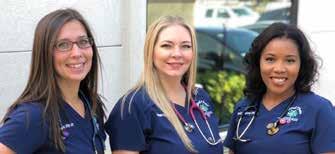
3535 Victory Group Way, Suite 305, Frisco, TX 75034
Lida Aghdam, M.D.
Lida Aghdam, M.D., is certified in internal medicine, women’s health and gynecology. She attended East Tennessee University, where she majored in chemistry and biology, graduated summa cum laude and studied medicine at Quillen College. Aghdam came to Dallas for an internal medicine residency at Presbyterian Hospital and did a fellowship in gynecology and women’s health at the Mayo Clinic, where she was mentored by Dr. Michael Born and learned about hormone replacement therapy and breast cancer. She also studied Traditional Chinese Medicine in China before moving back to Dallas, where she founded Natural Balance Clinic in 2007.
Services include natural treatment of common medical conditions using functional, holistic, nutritional medicine. Ashdam specializes in bioidentical hormone treatment, weight gain, high cholesterol/ blood pressure, thyroid issues, fibromyalgia, arthritis, constipation, IBS, leaky gut, depression and anxiety.
Her philosophy of healing is, “Let food be your medicine. Our mission at the Natural Balance Clinic is to introduce the most natural nutrition and supplements to balance the body without using medication. We believe that most diseases and illnesses happen because of the lack of healing nutrients in common food choices. Medications are temporary relief of more in-depth medical problems that need serious nutritional attention.” Natural Balance Clinic 7155 Colleyville Blvd., Ste. 101, Colleyville 4819 State Highway 121, Ste. 14, The Colony 817-488-7878 • NaturalBalanceClinic.com
Gus Kotsanis, M.D.
Dr. Kotsanis attended Northern Illinois University, the University of Athens Medical School, in Greece and did his residency at Loyola University of Chicago. His 37-year medical practice spans every diagnosis and age group, welcoming international and domestic patients. His functional and translational practice parlays research into practical treatments. His 1991 groundbreaking study in biomedical treatment for autism effected changes by augmenting immunity and using nutrition and auditory training to reduce symptoms and improve behavior and speech.
Disciplines he employs include nutritional, functional, homeopathic, chelation, regenerative, energetic and oxidative medicine. Mainly focused on complex patients, he also has many young and middle-aged athletic, wellness and anti-aging patients.
Core specialties include cancer, allergy, autism, anti-aging, Lyme, bioidentical hormone therapy, neurodegenerative conditions, chronic infections, and tissue repair. He treats patients individually based on physical, emotional, spiritual, metabolic, biochemical and genetic makeup. Kotsanis also helps athletes to prevent injury and repair injured tissues using nutritional IV, oxidative injections, microcurrent, PRP and other regenerative therapies.
Educating physicians and patients through events held in his clinic, his mission is to empower patients to take back the freedoms they may have given over to insurance and government. He states, “Kotsanis Institute uses ancient wisdom and modern science to bring about health and balance.” Kotsanis Institute of Functional Medicine 2260 Pool Rd., Grapevine 817-854-1655 • KotsanisInstitute.com
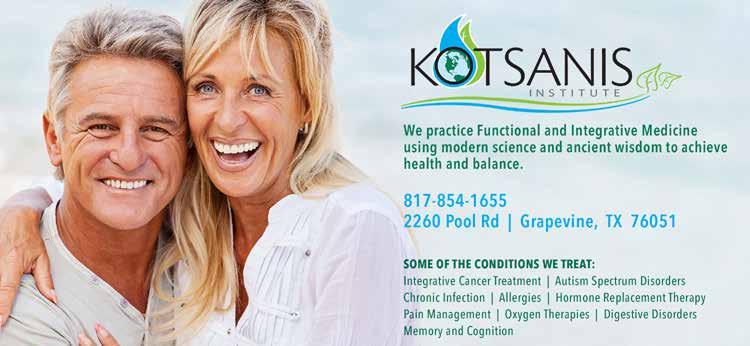
business spotlight
Promoting Resiliency in the Nursing Profession American Holistic Nurses Association
by Sheila Julson

The American Holis- taking care of the patient as a tic Nurses Asso- whole—the body, mind and ciation (AHNA) is a spirit; including alternative mononprofit specialty nursing dalities as appropriate, and they association that serves may not always be appropriate; more than 5,000 nurses and third, which I feel is the and holistic healthcare most important, is taking care professionals worldwide. of the nurse first.” The organization strives While some clinical and to promote holism in the hospital settings are incorponursing profession and rating aromatherapy, relaxation believes, “Every nurse is a and meditation rooms for their holistic nurse.” Lyn McCright nurses, McCright notes that
Lyn McCright, nurses often don’t have the time leader of the Central Texas chapter of to partake in self-care modalities during the AHNA, sees the organization as their busy days. “So, we’re bringing holism instrumental in bringing holism back to directly to the nurse, so she or he can find nursing associations because they include all clinical areas, so member nurses don’t see just one patient type. Any nurse is welcome to be a member, but the organization also accepts anyone from the public that is interested in holistic nursing.
This year, AHNA hopes to increase membership and feature their members as speakers for their monthly meetings. In March, when COVID-19 hit, the organization hosted weekly webinars so they could support nurses. Whether on the frontlines or elsewhere in the profession, McCright affirms the entire profession was impacted in one way or another. “It was a new situation for all of us,” she says.
McCright adds that there’s been a

conventional health care. “We’re including alternative modalities, but in a holistic way,” she explains. “Lots of conventional healthcare is starting to include holistic modalities, but our three major tenets are one’s own resilience first, and move from there.”
McCright has been with AHNA for more than 10 years and says the organization has been one of the fastest-growing
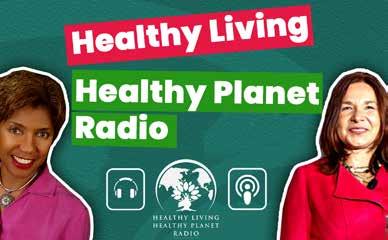
Listen to your favorite Broadcasts of Healthy Living Healthy Planet Radio now on YouTube
high level of burnout and growing dissatisfaction in the profession. “That level of dissatisfaction is now intersecting with the transformation coming within health care,” she advises. “AHNA continues to be an avenue of support for nurses that are burned out. It comes down to knowing that supportive peace is inside all of us, and it is that wisdom we all share that can be tapped into at any time. When we’re looking for resilience in ourselves, it helps us find our bearings, and when we find our bearings, we can help our colleagues find theirs.”
For more information about American Holistic Nurses Association, visit AHNA. org. See ad, page 15.


